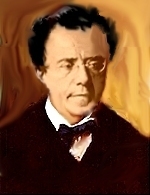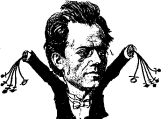|
Xtend
 Listen
Listen
 Period
Period
 Country
Country
 Quotation
Quotation
 Projects
Projects
 Dictionary
Dictionary
 Finders
Finders
|
 Born:
7 July 1860, Kalischt, Austria Born:
7 July 1860, Kalischt, Austria
Died: 18 May 1911, Vienna, Austria
Mahler, Gustav
A son of a Jewish storekeeper who
became a great conductor and a prominent Romantic composer. He got
his musical education in the Vienna conservatoire, and learned composition from Bruckner
conservatoire, and learned composition from Bruckner .
As a composer, he took it upon himself to develop symphony .
As a composer, he took it upon himself to develop symphony  as a means of expression for the human spirit. In this sense, he
is Beethoven's
as a means of expression for the human spirit. In this sense, he
is Beethoven's follower, and like him, he kept breaking the boundaries of symphonic form.
The orchestra structure and the number of players that grew beyond recognition
is also among the characteristics of his ten symphonies (like Schubert
follower, and like him, he kept breaking the boundaries of symphonic form.
The orchestra structure and the number of players that grew beyond recognition
is also among the characteristics of his ten symphonies (like Schubert ,
Mahler also has an unfinished symphony - No. 10),
and especially known is his Symphony no. 8 "Symphony
of a Thousand", whose performance requires hundreds of players
and singers; they represent the entire universe, participating in singing. ,
Mahler also has an unfinished symphony - No. 10),
and especially known is his Symphony no. 8 "Symphony
of a Thousand", whose performance requires hundreds of players
and singers; they represent the entire universe, participating in singing.
 Mahler
also wrote lieder Mahler
also wrote lieder  - tiny songs for a voice and a piano. His cycles "Elegies
on Children's Death" ("Kindertotenlieder")
and "Songs of a
Wandering Apprentice" ("Lieder
eines fahrende Gesellen") are
known, next to Schubert's cycles, as the most
excellent Romantic repertory song collections. "A
Boy's Magical Horn" ("Des Knaben Wunderhorn"),
the collection of folk songs he composed, became a source of themes for
his symphonies.
- tiny songs for a voice and a piano. His cycles "Elegies
on Children's Death" ("Kindertotenlieder")
and "Songs of a
Wandering Apprentice" ("Lieder
eines fahrende Gesellen") are
known, next to Schubert's cycles, as the most
excellent Romantic repertory song collections. "A
Boy's Magical Horn" ("Des Knaben Wunderhorn"),
the collection of folk songs he composed, became a source of themes for
his symphonies.
 At
the end of his life, Mahler left Anti-Semitic Vienna and moved to New
York At
the end of his life, Mahler left Anti-Semitic Vienna and moved to New
York ,
where he successfully ran the Metropolitan Opera and conducted it's orchestra.
Mahler is one of symphony's giants, and his
9th Symphony is viewed as the peak of his
work, and so is "The Song of the Earth" ,
where he successfully ran the Metropolitan Opera and conducted it's orchestra.
Mahler is one of symphony's giants, and his
9th Symphony is viewed as the peak of his
work, and so is "The Song of the Earth" ("Das Lied von der Erde") - a symphonic
song cycle based on Chinese
("Das Lied von der Erde") - a symphonic
song cycle based on Chinese poetry. His Symphony no. 1, "Titan"
poetry. His Symphony no. 1, "Titan"   ,
is also very popular. ,
is also very popular.
Mahler supported Schoenberg both artistically and financially and the latter's 'Theory of Harmony'
was dedicated to him.
both artistically and financially and the latter's 'Theory of Harmony'
was dedicated to him.




Mahler on the WWW
 Sites
Sites
|
 Audio
Audio
|
 Video
Video
|
 Images
Images
|
 MIDI
MIDI
|
|
Description
He Was

He Lived in the
 Romantic period
Romantic period
In
 Austria
Austria
And now on the WWW
 Home Page
Home Page
|
 Born:
7 July 1860, Kalischt, Austria
Born:
7 July 1860, Kalischt, Austria